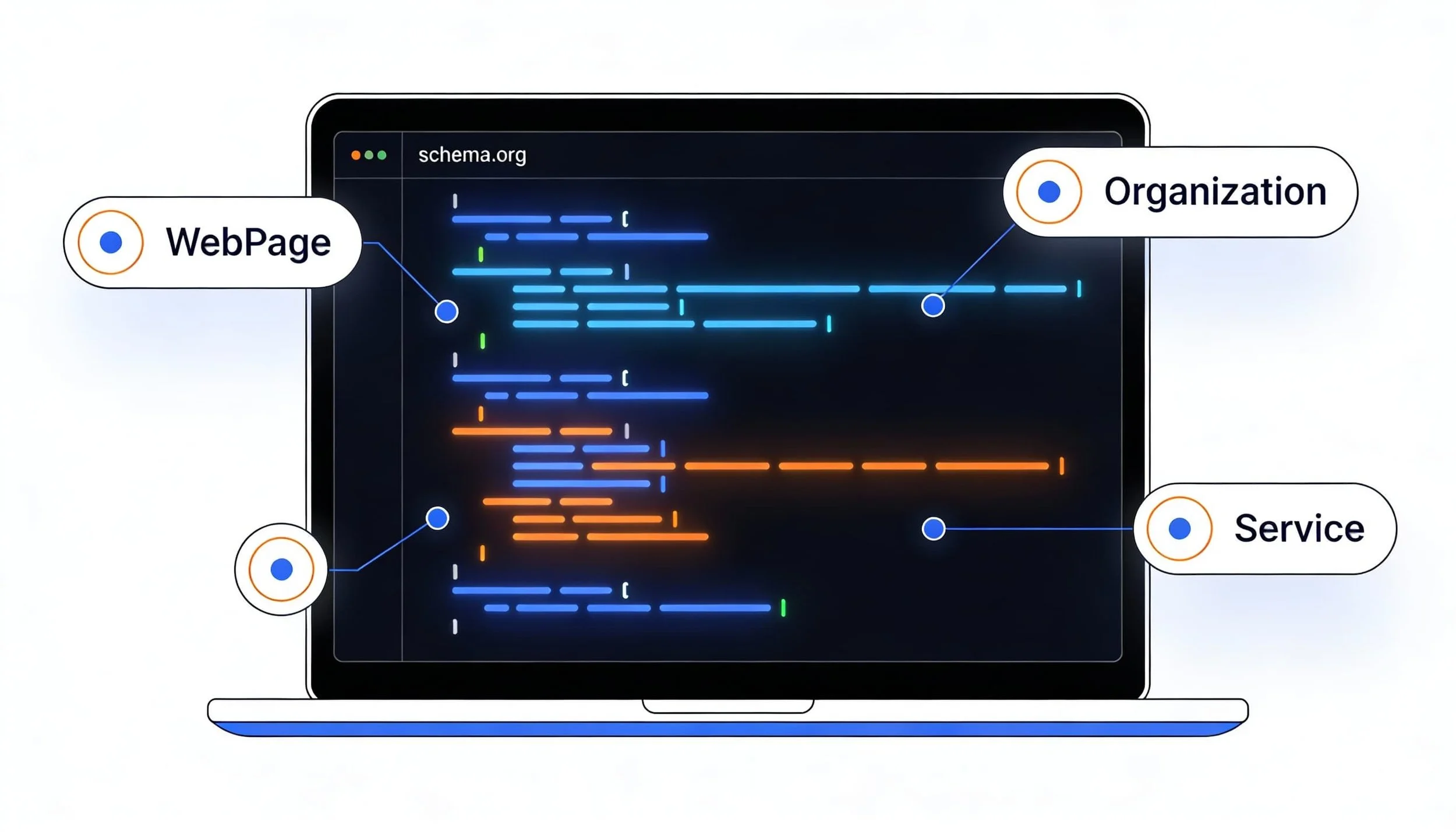Voice Search Optimization: How to Improve Your Visibility in 2026
- 20% of mobile searches are voice-activated: Voice search is growing exponentially with smart speakers and mobile use
- Local and conversion-oriented: Voice queries are often action-oriented with "near me" and "open now" intentions
- FAQ optimization is crucial: Use natural questions as H2 titles with direct answers in the first paragraph
- Structured data is essential: LocalBusiness, FAQ schema, opening hours markup for voice assistants
- Mobile Speed is Essential: Voice search occurs on mobile, making fast loading times and clear CTAs crucial.
- Use Natural Language: Write as people speak, using short sentences and an informal tone where appropriate.
Voice-activated search is no longer a thing of the future. From "Okay Google, where's the nearest Etos?" to "Alexa, what are the opening hours of café De Roos?", voice search is becoming an increasingly important part of our digital routine. Local businesses and service providers, in particular, can benefit from this.
The figures speak for themselves. According to Think with Google, 27% of the global online population actively uses voice search on mobile devices, and this percentage grows year after year. For marketers, this presents a new opportunity to be found, but also requires a different approach to SEO strategies.
Why Voice Search Differs from Traditional Search
Longer and Conversational Search Queries
Where people typically type "marketing agency Antwerp," they ask their phone: "What is the best online marketing agency in Antwerp?" This shift from short keywords to full sentences demands a different content approach.
“More than 50% of adults use voice search daily, and 20% of all mobile searches are done by voice.”
Strong Focus on Local Results
Voice searches often have a local character. ComScore research shows that 58% of voice searches are focused on local business information such as opening hours, addresses, and contact details. This makes local SEO more crucial than ever.
Answers Instead of Links
With voice search, the assistant usually reads out one answer. Your goal is therefore not just to rank in the top 10, but to become the specific answer that is read aloud. This makes featured snippets and position zero crucial.
Practical Strategies for Voice Search Optimization
1. Answer Direct Questions in Your Content
Structure your content around frequently asked questions that your target audience has. Start paragraphs with question sentences and immediately provide a clear, complete answer below them. This approach aligns perfectly with AI-driven content strategies.
Example:
H2: How much does a Shopify webshop cost?
Answer: A Shopify webshop costs between €29 and €299 per month, depending on your chosen subscription and required functionalities.
2. Optimize for "Near Me" Searches
Ensure your Google Business Profile is fully completed with:
Correct NAP data (Name, Address, Phone Number)
Current opening hours
Customer reviews
Relevant categories and services
Also use local search terms in your content. Instead of just "SEO specialist," write "SEO specialist Mechelen" or "local SEO expertise in Flanders." You can find more tips in our guide on local SEO in Belgium.
3. Implement structured data markup
Search engines better understand your content with schema.org markup. There are three important types for voice search. More details on technical implementation can be found in our guide on structured data for Google visibility.
LocalBusiness Schema:
<script type="application/ld+json">
{
"@context": "https://schema.org",
"@type": "LocalBusiness",
"name": "ClickForest",
"address": {
"@type": "PostalAddress",
"streetAddress": "Zwarte Leeuwstraat 78A",
"addressLocality": "Bonheiden",
"postalCode": "2820",
"addressCountry": "BE"
},
"telephone": "+32473846627",
"openingHours": "Mo-Fr 09:00-17:00"
}
</script>
FAQ Schema for frequently asked questions HowTo Schema for step-by-step guides and instructions
4. Improve your site speed and mobile experience
Voice searches primarily occur on mobile devices. Google's Core Web Vitals are essential:
Load time under 3 seconds
Mobile-first responsive design
Clear navigation and touch-friendly buttons
Readable fonts without zooming
Specific tips for e-commerce can be found in our guide on mobile optimization for e-commerce.
“Voice search is fundamentally different from text search – people ask full questions instead of typing keywords.”
5. Use natural, conversational language
Write as people speak, not as they type. This means:
Using contractions (we're, you'll, can't)
Informal tone where appropriate
Short, clear sentences
Avoiding jargon and technical terms
This approach aligns with modern AI copywriting techniques and better prompt writing.
6. Focus on featured snippets
Featured snippets are voice search gold. To achieve position zero:
Answer specific questions in 40-60 words
Use bullet points and numbered lists
Optimize for "what is", "how does it work", "why" questions
Structure content with clear headings
This forms an important part of modern SEO strategies and conversion optimization.
Tools for voice search research and optimization
Free tools:
AnswerThePublic: discover questions around your core topics
Google Search Console: analyze long-tail queries and impressions
Google Trends: view the popularity of question-driven search terms
AlsoAsked: visualizes related questions people ask
Premium tools:
SEMrush Position Tracking: monitor featured snippet opportunities
Ahrefs Keywords Explorer: filter by question words and voice search intent
BrightEdge: voice search analytics and competitive insights
“58% of consumers use voice search to find local business information such as opening hours and locations.”
For local businesses, these optimizations are especially important, as described in our performance marketing guide.
Voice Search Success Tips by Industry
Local service providers (restaurants, hairdressers, garages)
Emphasize opening hours and location
Use "near me", "in the area" and city names
Add menus, price lists, and services
Ensure recent Google reviews
E-commerce and Retail
Product-specific FAQs ("What is the best smartphone under €500?")
Comparison content ("iPhone vs Samsung")
Instructional content ("How does contactless payment work?")
Local inventory and pickup options
For Shopify-specific optimization, check out our guide on Shopify SEO.
B2B and consulting
Industry-specific expertise ("What is marketing automation for lawyers?")
Process and methodology explanation
Case studies with tangible results
Team and company information
Find more about B2B strategies in our LinkedIn marketing guide.
Measurable results and KPIs
Track these metrics to measure your voice search performance:
Organic traffic growth
Focus on long-tail traffic (4+ words) and conversational queries
Featured snippet wins
Monitor how many featured snippets you own for target keywords
Local ranking positions
Track "near me" rankings in Google My Business Insights
Branded voice searches
Measure how often people ask about your company via voice
“Voice interfaces fundamentally change how we interact with technology - from typing to talking is a paradigm shift.”
Common mistakes in voice search optimization
1. Keyword stuffing in natural content Voice search requires natural language, not forced keyword repetition.
2. Ignoring local SEO Many businesses forget to keep their Google Business Profile up-to-date.
3. Overly technical answers Complex explanations don't work for quick voice responses.
4. No mobile testing Content that works well on desktop can be unreadable on mobile.
5. Implementing schema markup without testing Use Google's Structured Data Testing Tool to validate your markup.
The future of voice search and AI
Voice search is evolving rapidly due to improvements in Natural Language Processing (NLP) and machine learning. Google's BERT and MUM updates are making search engines increasingly better at understanding context and intent. This fits perfectly into the broader trend of SEO to GEO.
Emerging trends to watch:
Multimodal search: combination of voice, visual, and text
Conversational commerce: purchases via voice assistants
Hyperlocal targeting: search results with 100-meter precision
Voice SEO tools: specialized analytics for voice performance
You can read more about future marketing trends in our AI marketing strategies guide.
“Structured data for FAQs increases your chance of being selected as a voice search answer by an average of 40%.”
Getting started with voice search optimization
Start small and build systematically:
Week 1-2: Audit your current content for voice search opportunities
Week 3-4: Implement basic FAQ sections on key pages
Week 5-6: Fully optimize your Google Business Profile
Week 7-8: Add structured data to key pages
Month 2: Create new content specifically for voice queries
Month 3: Measure results and optimize further
Voice search is not a passing trend. It is a fundamental shift in how people search for and consume information. By starting with voice search optimization now, you build a competitive advantage that will remain valuable for years to come.
Ready to get started? View our SEO services or schedule a strategy consultation to develop your voice search strategy.

🚀 More leads, higher conversion, better ROI
This article provided you with insights. Now it's time for action. Whether you want to build a profitable webshop, generate more revenue from performance marketing or SEO, or grow with AI marketing - we provide concrete support to help you move forward.
💬 Discuss your challenge directly with Frederiek: Schedule a free strategy consultation or send us a message
📧 Prefer to email? Send your question to frederiek@clickforest.com or call +32 473 84 66 27
Strategy without action remains theory. Let's take your next step together.
Frequently asked questions about voice search optimization
-
Voice search optimization involves adapting your website and content to be better found in voice-activated searches via assistants like Google Assistant, Siri, or Alexa. It focuses on natural language, direct answers, and local discoverability.
-
Due to the popularity of smartphones and smart speakers, more and more people are searching by voice. It's faster and more convenient, especially on the go or while multitasking. Google reports that 27% of mobile users worldwide use voice search.
-
Voice searches are longer, more natural, and often formulated as complete questions. Instead of "pizza Amsterdam," people say "Where can I order the best pizza in Amsterdam?". This requires different content strategies.
-
Local businesses such as restaurants, shops, hairdressers, garages, and service providers have the greatest opportunity. Voice searches often have a local nature, with questions about opening hours, locations, and contact information.
-
Use natural, conversational language and answer direct questions in your content. Add FAQ sections, optimize for local search terms, and implement structured data markup. Also, ensure a fast, mobile-friendly website.
-
Featured snippets are the short answers that appear at the top of Google search results. In voice search, these are often read aloud as the answer. By optimizing your content for position zero, you increase your chances of voice search traffic.
-
Free tools like AnswerThePublic, Google Search Console, and AlsoAsked help in finding question-based search terms. Premium tools such as SEMrush and Ahrefs offer deeper voice search analytics and competitive intelligence.
-
Yes, structured data helps search engines better understand and categorize your content. LocalBusiness, FAQ, and HowTo schema markup are particularly valuable for voice search optimization.
-
Crucial. The majority of voice searches occur on mobile devices. Fast loading times, responsive design, and mobile-friendly navigation are essential for voice search success.
-
Google does not display separate voice search data, but you can analyze long-tail conversational queries in Search Console. Tools like BrightEdge and SEMrush offer more specific voice search analytics.
-
Depending on your starting position, you will see initial results within 4-8 weeks. Featured snippet gains can be quicker, while local voice search often takes 2-3 months to build momentum.
-
No, voice search optimization complements your existing SEO. The fundamentals remain the same: good content, technical optimization, and user experience. Voice search only requires additional tactics.
Sources & References
Voice search statistics and trends:
DemandSage: ‘68 Voice Search Statistics 2025: Usage Data and Trends’ – https://www.demandsage.com/voice-search-statistics/
Yaguara: ‘62 Voice Search Statistics 2026 (Number of Users & Trends)’ – https://www.yaguara.co/voice-search-statistics/
ElectroIQ: ‘Voice Search Statistics by Devices, SEO, Usage and Marketing (2025)’ – https://electroiq.com/stats/voice-search-statistics/
Huddle Creative: ‘Voice Search for Brands: 35 Statistics & Trends’ – https://www.huddlecreative.com/blog/voice-search-for-brands-trends-statistics
Voice search optimization strategies:
circle S studio: ‘How to Optimize for Voice Search in 2025’ – https://circlesstudio.com/blog/optimize-for-voice-search-2025/
McNeece: ‘How To: Best Voice Search Optimization Steps for 2025’ – https://www.mcneece.com/2025/05/how-to-best-voice-search-optimization-steps-for-2025/
GreenBananaSEO: ‘Voice Search Optimization 2025 for Local Biz’ – https://greenbananaseo.com/voice-search-optimization-in-2025/
Local voice search & structured data:
Deborah.ba: ‘Voice Search Optimization for Local Businesses in 2025’ – https://deborah.ba/voice-search-optimization-for-local-businesses/
NoGood: ‘Schema for Voice Search: Structured Data & Voice SEO’ – https://nogood.io/blog/schema-for-voice-search/











